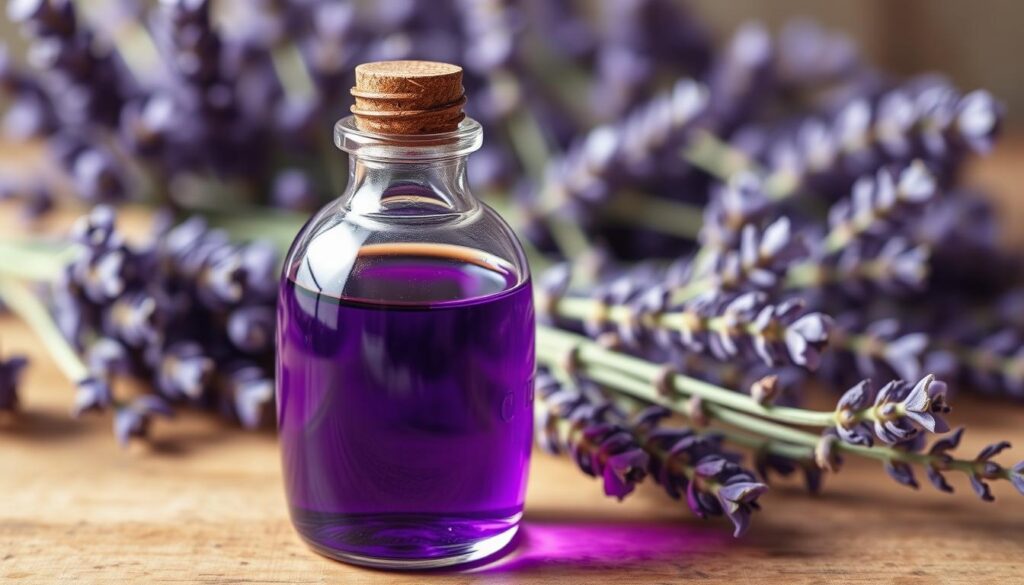Lavender Essential Oil: 7 Surprising Benefits for Better Sleep
Do you have trouble sleeping? You’re not alone. Many in the U.S. struggle to fall or stay asleep. Lavender essential oil is a natural solution that can help.
It calms and restores, making sleep better. Lavender oil can reduce anxiety and stress. It also helps with headaches, improving sleep quality.
Lavender essential oil can make your sleep better. Adding it to your bedtime routine can refresh you. It’s great for reducing sleep latency and improving sleep quality.
It creates a calming atmosphere. It calms your mind and body. This prepares you for a restful night, leading to better sleep.
Introduction to Better Sleep with Lavender Essential Oil
This article explores lavender essential oil’s sleep benefits. It’s calming and reduces anxiety and stress. We’ll discuss how to use it for better sleep.
You’ll learn about bedtime routines and daily use. Discover how to maximize its sleep-promoting effects. This can help you sleep better with lavender essential oil.
Key Takeaways
- Lavender essential oil has calming and restorative properties that can help you achieve better sleep.
- Using lavender essential oil can reduce anxiety and stress, making it easier to fall asleep.
- Lavender essential oil can alleviate headaches and other sleep disorders, leading to better sleep.
- Incorporating lavender essential oil into your bedtime routine can improve the quality of your sleep.
- Lavender essential oil is a natural and effective solution for promoting relaxation and reducing sleep latency.
- Lavender essential oil can be used in various ways, including diffusion, topical application, and inhalation, to promote better sleep.
- By using lavender essential oil, you can wake up feeling refreshed and rejuvenated, ready to take on the day with better sleep.
Understanding Lavender Essential Oil and Its Historical Use
Lavender oil has been a key part of traditional medicine for centuries. Its historical use goes back to ancient times. You can dive into the rich history of lavender oil and its many uses.
The use of lavender oil has changed a lot over time. From ancient times to today, it has become widely recognized. Learning about the historical use of lavender oil can help you understand its importance in traditional medicine.
Ancient Origins of Lavender
The ancient Greeks and Romans valued lavender for its healing and calming effects. You can find out how lavender was used back then.
Traditional Medicinal Applications
Lavender oil has been used for centuries in traditional medicine. It helps soothe skin irritations and promotes relaxation. You can learn about the different ways lavender oil was used in traditional medicine.
Modern Scientific Recognition
Today, science has confirmed lavender oil’s benefits. It can help reduce anxiety and stress. You can discover how lavender oil is recognized today and its benefits for your health.
By learning about the historical use of lavender oil, you can see its value in traditional medicine. Lavender oil is a natural remedy that can help with relaxation and stress relief.
The Science Behind Lavender’s Calming Properties
Lavender essential oil can positively affect the limbic system. This system controls our emotions and sleep. Lavender’s calming properties come from how it interacts with the brain, leading to relaxation and better sleep.
Research shows that smelling lavender can lower anxiety and help sleep better. For instance, a study found that those who smelled lavender oil felt less anxious than others. Lavender also helps sleep by increasing slow-wave sleep and making it easier to fall asleep.
The benefits of lavender are clear:
- Reduces anxiety and stress
- Improves sleep quality
- Increases slow-wave sleep
- Reduces sleep latency
In summary, lavender’s calming properties come from its interaction with the brain’s limbic system. This interaction leads to relaxation and better sleep. Adding lavender essential oil to your bedtime routine can greatly improve your sleep quality.
How Lavender Essential Oil Affects Your Brain Chemistry
Lavender essential oil deeply affects your brain chemistry. It influences your mental and emotional health. It works with your central nervous system to change levels of important chemicals like serotonin and dopamine.
These chemicals help control your mood and reduce stress and anxiety. Studies show lavender essential oil can bind to serotonin and NMDA receptors. This suggests it can affect serotonin levels and how glutamate works in the brain.
Impact on Neurotransmitters
Lavender essential oil’s components, like linalool and linalyl acetate, bind to serotonin receptors. This helps manage mood and lowers anxiety and stress. It also interacts with NMDA receptors, which can calm the brain.
Influence on Sleep Cycles
Lavender essential oil improves sleep in adults without insomnia. A review of 20 studies found it boosts sleep quality. 14 of these studies showed positive results.
Effects on Stress Hormones
Lavender essential oil’s calming effects can lower stress hormones like cortisol. High cortisol levels can disrupt sleep and cause anxiety and depression. By reducing stress, lavender essential oil helps balance brain chemistry and improves well-being.
Key Components of Pure Lavender Essential Oil
Pure lavender essential oil is known for its ability to calm and relax. It contains linalool and linalyl acetate, which are key to its effects. A study found linalool to be between 20.60% and 35.99%, and linalyl acetate between 12.58% and 19.65% in different samples.
Lavandulyl acetate, t-p3-ocimene, α-terpineol, nerol, neryl acetate, and β-caryophyllene are also important. They work together to reduce anxiety. A review of 11 studies showed that lavender oil inhalation lowered anxiety in 10 of them.
The benefits of pure lavender essential oil come from how it interacts with the nervous system. This interaction leads to changes that help with anxiety. Some benefits include:
- Reduced anxiety and stress
- Improved sleep quality
- Lower blood pressure and heart rate
- Reduced respiratory rate

The components of pure lavender essential oil make it a great tool for relaxation and anxiety relief. Knowing about these components helps you choose the right lavender oil and use it in your daily life.
Proven Sleep Benefits of Lavender Essential Oil
Lavender essential oil is a natural way to improve your sleep. It helps you relax, reducing anxiety and stress. This makes it easier to fall asleep and sleep better.
Research shows lavender essential oil can greatly improve your sleep quality. It’s a key factor in getting good rest.
Using lavender essential oil for sleep offers many benefits. These include:
- Reduced sleep latency, allowing you to fall asleep faster
- Improved sleep quality, resulting in better rest and recovery
- Enhanced deep sleep phases, which are essential for physical and mental rejuvenation
Adding lavender essential oil to your bedtime routine can help. You can use it in a diffuser, apply it to your skin, or inhale it directly. It ensures a restful and refreshing sleep.
Lavender essential oil is calming and soothing. It reduces stress and anxiety, promoting relaxation. It also improves deep sleep phases. This way, you wake up feeling refreshed and ready for the day.
Best Methods for Using Lavender Oil at Bedtime
Getting ready for bed can be a breeze with lavender oil. Lavender oil helps you relax, easing anxiety and stress. This makes it easier to fall asleep and stay asleep.
There are many ways to use lavender oil before bed. You can put a few drops in your diffuser or apply it to your skin. Try it on your wrists or behind your ears. Some people also inhale it from a cloth or handkerchief.
Here are some benefits of using lavender oil at bedtime:
- Promotes relaxation and reduces anxiety and stress
- Improves sleep quality and duration
- Can help alleviate insomnia and other sleep disorders
Adding lavender oil to your bedtime routine can make you feel refreshed. Whether you inhale it or apply it to your skin, it’s a natural way to better your sleep and health.
Creating Your Perfect Bedtime Aromatherapy Routine
To make a bedtime aromatherapy routine, add lavender oil to your daily life. Bedtime aromatherapy can help you sleep better and feel refreshed in the morning.
Using a diffuser is a simple way to add lavender oil to your bedtime. Just put a few drops of lavender oil in the diffuser. It will fill your room with a soothing scent.
Diffuser Methods
- Add 5-7 drops of lavender oil to the diffuser
- Run the diffuser for 30 minutes to 1 hour before bedtime
- Adjust the amount of oil and diffuser time according to your preferences
Pillow Spray Recipes
You can also make a pillow spray with lavender oil and water. Mix a few drops of lavender oil with water in a spray bottle. Then, spritz it on your pillow before bed.
Massage Blend Instructions
Another option is to use lavender oil as a massage oil. Mix a few drops of lavender oil with a carrier oil. Then, massage it onto your skin before bed.
Combining Lavender Oil with Other Sleep-Promoting Practices
Exploring lavender oil for better sleep? Wondering how to boost its effects? Mixing lavender oil with other sleep-promoting practices can greatly improve your sleep quality. Adding meditation and deep breathing to your bedtime routine can help relax you. This can also reduce anxiety and stress, leading to better sleep.
Here are some ways to blend lavender oil with sleep-promoting practices:
- Use lavender oil in a diffuser while meditating or deep breathing.
- Add a few drops of lavender oil to your pillow or bedding for relaxation.
- Include lavender oil in your massage routine to ease muscle tension and promote sleep.
By mixing lavender oil with other sleep-promoting practices, you can craft a strong sleep routine. This routine addresses various sleep health aspects. Always use high-quality lavender oil and follow proper usage guidelines for safe and effective use.
Safety Guidelines and Precautions
When using lavender oil, it’s important to follow safety guidelines. This ensures you use it safely and effectively. Lavender oil can help you relax and sleep better. But, it’s key to know the risks and take precautions.
Proper Dilution Ratios
To avoid skin irritation, mix lavender oil with a carrier oil like coconut or jojoba oil. Use 1-2% lavender oil concentration. For specific advice, talk to a healthcare professional or a certified aromatherapist.
Some important safety tips for using lavender oil include:
- Always read the label and follow instructions
- Perform a patch test before using a new product
- Keep lavender oil out of reach of children and pets
Potential Allergic Reactions
Even though lavender oil is usually safe, some might have allergic reactions. This could be skin irritation or breathing problems. If you have any bad reactions, stop using it and talk to a doctor.
Choosing High-Quality Lavender Essential Oil
Choosing the right lavender essential oil is key to enjoying its benefits. You want an oil that is pure, strong, and works well. Look for quality signs and pick brands you can trust.
Using high-quality lavender essential oil can greatly improve your experience. It’s important to pick a product without harmful additives. Also, make sure it was made safely and effectively.
Quality Indicators to Look For
- Purity: Look for oils that are labeled as 100% pure and free from additives.
- Potency: Choose oils that have a high concentration of active compounds.
- Extraction method: Opt for oils that have been extracted using a safe and effective method, such as steam distillation.

Trusted Brands and Storage Tips
Some top brands of high-quality lavender essential oil are doTERRA and Mountain Rose Herbs. Keep your oil in a cool, dark spot. Avoid direct sunlight and heat.
Common Mistakes to Avoid When Using Lavender Oil
Using lavender oil can be tricky. It’s important to know the common mistakes that can make it less effective or even harmful. One big mistake is using too much lavender oil. This can make you less sensitive to its calming effects. To fix this, keep your use short and don’t use it all the time.
Another mistake is ignoring safety rules. This includes using too much oil or not mixing it with a carrier oil. This can cause skin problems, headaches, or breathing issues. Always mix lavender oil with a carrier oil like jojoba or coconut oil. Also, do a patch test before using it on a bigger area.
Some people need to be extra careful with lavender oil. This includes pregnant women, breastfeeding moms, and those with sensitive skin like eczema or psoriasis. Lavender oil can also mix badly with certain medicines, like benzodiazepines or blood thinners. Always talk to a doctor before adding lavender oil to your routine.
Here are some common mistakes to avoid when using lavender oil:
- Using too much oil, which can cause overpowering scents or skin irritation
- Not following proper safety guidelines, such as diluting the oil with a carrier oil
- Not storing the oil properly, which can alter its chemical composition and reduce its effectiveness
- Using the oil continuously, which can lead to olfactory fatigue and reduce its calming properties
By knowing these common mistakes and avoiding them, you can safely and effectively use lavender oil. Enjoy its calming and stress-relieving benefits.
Addressing Myths About Lavender Essential Oil Use
There are many myths about lavender essential oil. You might think it’s only for relaxation. But, it actually helps with sleep, anxiety, and stress too.
Some believe lavender essential oil is only for aromatherapy. But, it can be used in many ways. This includes applying it to the skin, inhaling it, and even eating it (but only with caution and under a doctor’s advice).

Separating Fact from Fiction
To enjoy lavender essential oil fully, it’s key to know what’s true and what’s not. Here are some myths debunked:
- Lavender essential oil is only for relaxation: False. It also helps with inflammation and sleep.
- Lavender essential oil is not suitable for children: False. It can be used on kids, but make sure to mix it with a carrier oil and use it carefully.
- Lavender essential oil can cure anxiety: False. It can help with anxiety, but it’s not a complete solution. Always use it with other treatments and under a doctor’s watch.
Knowing the truth about lavender essential oil helps you use it safely and effectively. Always talk to a healthcare professional before using it, even more so if you have health issues or are on medication.
Troubleshooting Your Lavender Oil Sleep Routine
Using lavender oil in your sleep routine might face some common issues. These problems can affect how well it works. It’s key to know these problems and find ways to solve them.
Some people might find that the scent of lavender oil doesn’t work as well over time. This is because our bodies get used to the smell. Also, how you use the oil can change its effect. For example, using a diffuser might spread the scent too thin, making it less strong near you.
To make lavender oil work better in your sleep routine, try these tips:
- Put lavender oil on pulse points like wrists, behind the ears, or the neck. This keeps the scent close to you all night.
- Use sleep masks with lavender oil or put dried lavender under your pillow. This gives you a strong scent while you sleep.
- Make sure your bedroom smells good and is the right temperature. This helps you relax better.
- Don’t use too much lavender oil at once. Using it too much can make your body get used to the smell. Try using it in short bursts instead.
- Try other ways to relax like meditation, deep breathing, or a warm bath before bed. These can help you sleep better.
By following these tips, you can get the most out of lavender oil. This can help you sleep better and feel more relaxed.
Conclusion: Embracing Better Sleep with Lavender Essential Oil
Exploring lavender essential oil opens up a world of relaxation and calm. It helps reduce anxiety and stress, leading to better sleep. Adding lavender essential oil to your bedtime routine can make your space peaceful. It calms your mind and body.
Studies show lavender essential oil greatly improves sleep quality. It helps you fall asleep quicker and sleep better. Its calming scent makes it a natural sleep booster.
To use lavender essential oil safely and effectively, there are a few ways. You can add it to your diffuser, mix it with a carrier oil for massages, or simply breathe in its scent before bed. By incorporating lavender essential oil into your bedtime routine, you’ll wake up feeling refreshed and ready for the day.
FAQ
What are the benefits of using lavender essential oil for sleep?
How does lavender essential oil interact with the brain’s limbic system?
What are the key components of pure lavender essential oil?
How can I use lavender oil at bedtime to promote relaxation and reduce anxiety and stress?
Can I combine lavender oil with other sleep-promoting practices to enhance its benefits?
What safety guidelines and precautions should I be aware of when using lavender essential oil?
How can I choose high-quality lavender essential oil?
What are some common mistakes to avoid when using lavender essential oil?
How can I troubleshoot issues with my lavender oil sleep routine?
Source Links
- https://www.ncbi.nlm.nih.gov/pmc/articles/PMC3612440/
- https://pubmed.ncbi.nlm.nih.gov/28579958/
- https://pubmed.ncbi.nlm.nih.gov/35708558/
- https://pubmed.ncbi.nlm.nih.gov/21870761/
- https://pmc.ncbi.nlm.nih.gov/articles/PMC10671255/
- https://www.hoshyoga.org/when-should-you-not-use-lavender-oil/
- https://www.pleasanthillsanctuary.com/aromatherapy/5-common-mistakes-people-make-with-aromatherapy-(and-how-to-avoid-them)
- https://www.glam.com/1150141/mistakes-you-may-not-know-youre-making-with-essential-oils/
- https://www.fithealthsolutions.com/common-mistakes-in-aromatherapy-and-how-to-avoid-them/
- https://www.saatva.com/blog/how-lavender-improves-sleep-quality/







